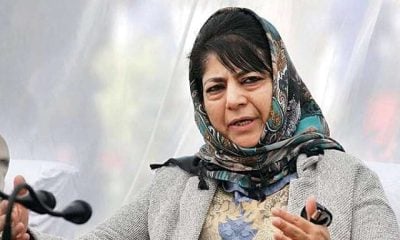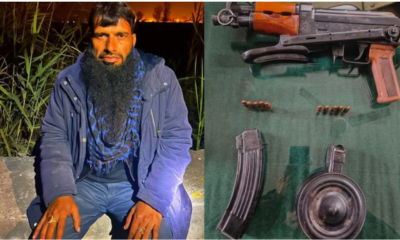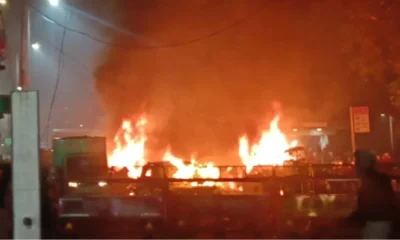~By Saeed Naqvi
I have never seen the electronic media so totally defiant of the BJP government. Home Minister Rajnath Singh’s avowed intention to calm Kashmir by announcing a Ramadan ceasefire appears to have been dismissed as “appeasement of Pakistan and terrorists”.
A guest peering out of one of the six windows on the TV screen was frothing in the mouth. “Murderers of our brave jawans are being shamelessly appeased.” The other went one better: “a brave nation does what the Sri Lankan army did to the LTTE – just finished them off.” The anchor on this Aaj Tak show Thursday evening looked angrier than both. This apparently is common fare.
The Communist Party of India is receiving signals from its Kashmir unit that it may have to rename itself. The ‘I’ in the CPI has been hurting the state unit for quite some time. But after the recent surge in shootings, stone pelting, “encounters”, sustained images of wailing women, trailing the spate of funerals, and relentless media jingoism, the “I” now invites physical danger. True, a defunct party by any name will remain defunct, but even so, Communist Party of Kashmir (CPK) will atleast not incur the wrath of the street.
The relative Ramadan peace is a good occasion to take stock. Even in days of drift in Kashmir during the time of P.V. Narasimha Rao, Atal Behari Vajpayee and Manmohan Singh, there was a semblance of political control by the National Conference and the PDP. Elements of the Hurriyat had fingers on the street pulse. The scene recently has been anarchic: there was no control.
Recent increase in violence was described by reliable sources as “indigenous” which is not what officials say. A narrative which discounts outside “meddling” is not honeyed music to the establishment. Nor to that shrill panel – on Aaj Tak. Ironical, isn’t it, that absence of outside support to the insurgency disturbs us?
Just when Kashmir was at fever pitch, the mayhem in Aligarh Muslim University erupted around the photograph of Mohammad Ali Jinnah.
Friends are in error if they consider the undiluted hooliganism on view in Aligarh an occasion to engage in a serious debate on Jinnah’s culpability in partitioning the country. The hoodlums of Aligarh were not busting their guts to have Jinnah’s portrait removed from the AMU union office. Quite the contrary. Hindu Yuva Vahini would love to provoke Aligarh hotheads to dig their heels in to preserve Jinnah in the university precincts. This will be the ammunition which can come in handy at all times. The campus will be the ordnance depot for frequent explosions in the service of the projected Hindu Rashtra.
This is not the first time in recent decades that AMU has been exploited for saffron politics. Ever since Prime Minister V.P. Singh aggravated identity politics by implementing the Mandal Committee report providing reservation in government jobs to lower castes, the BJP has rushed to prevent the caste structure from crumbling. Hindu consolidation, by building up the Muslim ogre, has been the obvious strategy.
Aligarh was frequently the target as part of this strategy. There was no Arnab Goswami in the 90s but Hindi newspapers played a lead role in widening the Hindu-Muslim divide.
A story appears in newspapers that, after horrendous riots in Aligarh city, some of the injured Hindus being taken to the University Medical College for treatment, are being killed by Muslim doctors and interns. Even though the university is only three hours drive from New Delhi, newspapers choose to rely on unverified agency copy which, in turn, quotes upper caste Hindi newspapers.
An incredible scene is being enacted on the outskirts of the university. Local scribes seated on chairs arranged in a circle under a mango tree, sip tea even as one Krishna Kumar Navman, BJP MLA from Aligarh, holds them in his thrall with graphic accounts of murders in the hospital.
“Has anyone visited the Medical College?”, I ask. They had not, they say, because it is “risky”.
At the medical college the picture is surreal: petrified doctors encircle me.
“No one has come to us for clarification”, they complain.
Why have they not reached out to the journalists with their story? After a long, pregnant silence, they speak up. They thought it would be dangerous stepping out of the campus “in the midst of communal violence”. This is what I call uninstitutionalized apartheid.
That was 30 years ago when there were no TV channels to inculcate saffron nationalism on the scale I saw the other day and which I have mentioned above.
Folks overtly agitated or elated at the turn of events in Aligarh, may find it sobering that Pakistan’s Jinnah is not the only leader around whom communal polarization can be contrived. Ram Navami processionist in Kankinara, 24 Parganas in West Bengal were so overpowered by the spirit of Rama that they pulled down the statue of Congress President and India’s first Education Minister, Maulana Azad – a person, who in his outlook was exactly the opposite of Jinnah. This was in preparation for the Panchayat elections currently in the news.
Protection to anti namaz lumpens in Gurugram, or those who pasted a Maharana Pratap Road placard on Akbar Road (the placard was removed the next morning), Modi clenching his fist at Tipu Sultan during the recent campaign, are minor episodes in an epic of hatred being manufactured for 2019 ofcourse, and beyond if need be. In this gameplan there is no real, long term respite for Kashmiris, Muslims, or Indo-Pak peaceniks. Alongside, the rage of the dalits and tribals is spiraling out of control. There is an element of simulation in anti Muslimism for political reasons but the retribution faced by dalits and tribals in the countryside is visceral.


 India News8 hours ago
India News8 hours ago
 India News9 hours ago
India News9 hours ago
 LATEST SPORTS NEWS8 hours ago
LATEST SPORTS NEWS8 hours ago
 India News8 hours ago
India News8 hours ago
 Latest world news2 hours ago
Latest world news2 hours ago
 India News22 mins ago
India News22 mins ago















